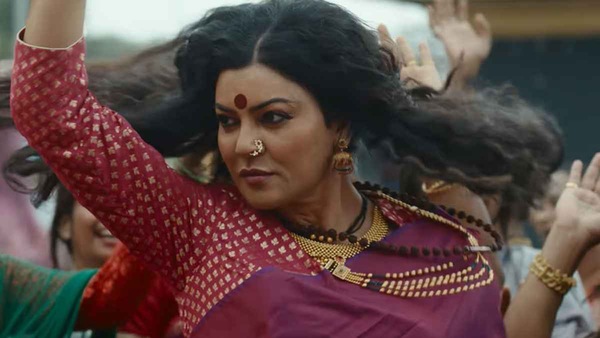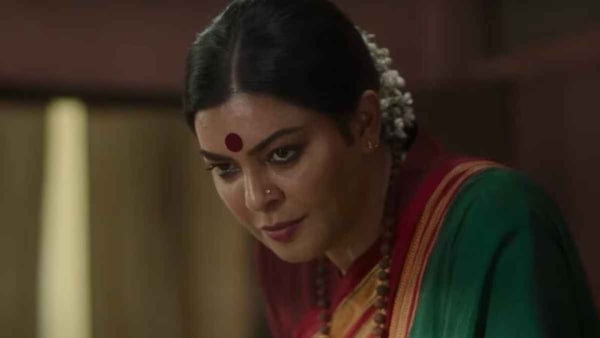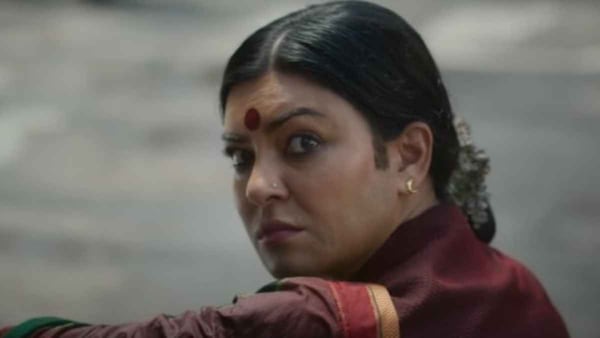Taali Review: Sushmita Sen struggles to salvage this stiff, limiting series
The series is more didactic than genuinely depthful

Last Updated: 07.58 PM, Jul 13, 2024
Story: Led by Sushmita Sen, Taali is based on the life and tribulations of transgender activist Gauri Sawant. It recounts her childhood, transitioning journey, quest for motherhood and ultimately, her fight for legal rights.
Review: Perhaps, the biggest mistake Taali makes is trusting its ideologically pure, empowering tone to solely fuel its biographical impulse. It belongs to that brand of art that firmly believes that good intentions alone will help it blaze past niggling issues in craft and treatment. Episode after episode, the show strives to reassure us that its articulation of trans rights, its willingness to pick up the baton and stride into risky ground is in itself worthy of applause. Unfortunately, Taali is too cooped up in its noble ambition, reluctant to echo the daring leaps of its protagonist.

It has barely been a week since Made in Heaven Season 2 released and once again, we find ourselves assailed by a show that fundamentally misreads ambitious storytelling and privileges it as the singular metric for using characters as its placeholders. Consistently capturing its characters through an issue-centric lens can get tiring. Sadly, no one in the show is quite able to escape the clutches of the underlined humanism that its creators Arjun Singgh Baran and Kartik Nishandar continually thrust at us. This heavily conscious framing does not allow the show to truly ponder the weight of the scars that the characters bear. The hurt doesn’t sink in, nor do victories move beyond the declamatory. Gauri is deservingly positioned as a singular force, unafraid to chart her path in complete loneliness and rejecting any customarily acceptable settlement. She is a leader in the truest sense, eager to make a clearing for those around her as well as behind her. But Kshitij Patwardhan’s screenplay does not situate Gauri’s character nor does it flesh out the various phases of her life with sufficient contextual depth or insight. She is fearless in rallying for what she believes in, no matter if the course of action to reach an end is more demanding than usual. Gauri advocates for education as the sole weapon for the trans community – to empower them and also assume gainful employment opportunities. The show has six half-hour long episodes, yet the resounding impression remains that of inadequacy in the script to encompass Gauri’s journey. Nowhere does it pause to take stock and meditate on the grief and indignity Gauri is put through during transitioning and thereafter. The unrelenting mother-activist veil that Gauri perenially flaunts keeps us from processing the true magnitude of her everyday fears and losses. As she delineates three battles in her life, for identity, survival and equality, each peculiarly comes across as skimmed. This is also due to the show’s structural dissonances, which are left unresolved. Of course, Taali packs bursts of inspirational turns. The show opens on the day Gauri is set to receive the Supreme Court verdict that would enforce citizenship rights for trans individuals. A favourable judgement is doubly important for her as it would enable her most cherished dream of being a mother and raising children with the necessary means and support she’d then be legally entitled to. In a voiceover, Gauri tells us she has often been called a spectacle-orchestrator but the defining identity she’d like to be accorded with is that of a mother. But the filter of maternal instinct turns into a burden that constricts the show’s vision, especially since the narrative has more than a few side-plots simmering beneath.
Gauri’s responses to an accompanying Western journalist, who is writing an article on her, leads us into long flashbacks into her formative years. It is when she was Ganesh, a teen who aches for long hair and who’d break into gender non-confirming dances moves at community programmes. Inevitably, her desire for womanhood often made her police officer father feel emasculated. In fact, he even drags her to a sex clinic and puts her on a diet of hormonal pills, thus succeeding in sprouting specks of facial hair that evoke both excitement and relief for the relentless parent. But Ganesh finds herself utterly drawn and captivated when she runs into a crowd of trans women at the theatre. When her early demonstrations are silenced ruthlessly, Ganesh decides to leave home to pursue the life she pines for.

However, the show curiously withholds itself in terms of Gauri building her incredible reserves of courage and persistence in Mumbai. Her struggles of eking out a livelihood in the city, being in the guise of a male waiter or establishing kinship networks with her community through her volunteering efforts, are dispensed within a few hurried minutes. The trans community’s hesitance and outright rejection of Gauri despite her sustained efforts until she undergoes the sex change operation certainly merited a more thematic consideration than what the screenplay doles out. There are stray scenes highlighting the various factions within the trans community, sharing an antagonistic relationship, because they don’t share equal access to economic resources. Gauri never directly talks about her tussles within her adopted ‘family’, but the conflicts are unwaveringly present. There is jealousy of other gurus, bitterness directed towards Gauri because of her growing celebrity, vitiated to the point that there are murder attempts made on her. Even the generosity and kindness of Naveen (Ankur Bhatia), who runs the NGO Gauri is associated with, is depicted through a painfully limited comparative lens of minority misery.
In its hasty efforts to cover temporal ground, Taali fails to establish the relationships at its core. Few scenes flash promise, like the one that Gauri shares with her sister (Hemangi Kavi) whose child she discovers is with the same school as her own. Both Sen and Kavi manoeuvre the beats of the scene deftly. Gauri is cognizant of her sister’s love and care but also recognises the evident discomfort between them and pulls away. Another poignant scene finds Gauri voicing her feelings with a close friend, Nargis (played by the promising Sheetal Kale). There is also a cheeky nod to Sen’s Miss Universe winning moment which is one of the lighter moments in the series.

However, the rest of the show resolutely sticks to a template that seeks to rouse rather than to investigate. Scenes including the panel discussion where Gauri erupts in rage come off as planted for delivering impact. Media coverage of the judgement day as well as the assemblage of public reactions feel too tailored and merely voice public concerns surrounding trans rights, including the community’s smeared history of prostitution and trafficking. All this cumulatively stifles the show from achieving any liberatory, affirmative potential.
Verdict: Propelling the show with ferocity and warmth, Sushmita Sen keeps the viewer immersed in Gauri’s world, even though it is one that frequently feels superficial. Even the central relationship between Gauri and her father is yet another retread in the estranged parent-child subgenre, lacking in specificity to wholly register itself. By the time Taali wraps, the show hardly affords a wholesome inner glimpse into such a galvanising figure. Its complacency in accepting inspirational beats to foreground a community that is routinely marginalised impedes the show from carving a finer, holistic, human subjectivity.

 Premium
Premium